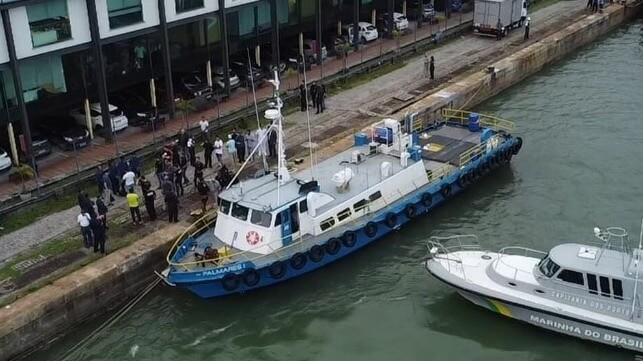Brazilian Navy Makes Largest Cocaine Seizure in National Waters

The Brazilian Navy working in coordination with the federal police made the largest-ever cocaine seizure in Brazilian waters. The government highlights it is part of an ongoing effort launched two years ago that seeks coordination of its agencies to combat illegal activities along the Brazilian coastline.
According to the report from the navy, they interdicted a small coastal vessel, the Palmares 1 approximately 18 nautical miles from Recife. Few details were provided on the capture but it might have seemed unusual that the small coastal vessel, which does not seem to even have an IMO registry number, was reporting that it was heading to Africa. The vessel normally carries passengers and small cargo on the coast.
After stopping the vessel, they discovered 3.6 tons of cocaine in large bales sitting out visible in the cabin of the ship. The police arrested five crewmembers and the navy reports the vessel was towed to Recife. The crewmembers could face up to 35 years in prison on international drug trafficking charges.

The 3.6 tons of cocaine was the largest seizure made in Brazilian waters (Marinha do Brasil)
The navy highlights the seizure was part of its efforts to protect the immense area of the coastline and Brazil’s territorial waters. They recognize various threats including illegal fishing, smuggling, and drug trafficking.
They are currently employing three 500-ton patrol vessels to monitor activity in the area. They note that the vessels were designed for long distances providing a greater radius of action. They are also able to handle adverse sea conditions on the high seas.
To protect and monitor Brazilian jurisdictional waters, the navy developed the Blue Amazon Management System (SisGAAz). The tool in use for the past two years integrates various equipment and systems and is connected to networks of the different government agencies. It facilitates information sharing.
The navy reports that the numbers show that the joint actions have achieved results in combating illicit activities. From 2020 to date, they have seized more than 17 tons of cocaine, 4.3 tons of hashish, 695 tons of cigarettes, 113.34 tons of fish, 15.7 tons of marijuana, and 3,146 cubic meters of illegal wood exports.
The federal government has also committed to expanding the efforts. The navy expects the addition of two more 500-ton patrol ships. They are also seeking to incorporate the Mangaratiba patrol vessel into the operations. The project for this vessel had been abandoned in 2016 but restarted in 2019. It is currently under construction at the Rio de Janeiro Navy Arsenal and is due to be commissioned in 2025.

that matters most
Get the latest maritime news delivered to your inbox daily.
